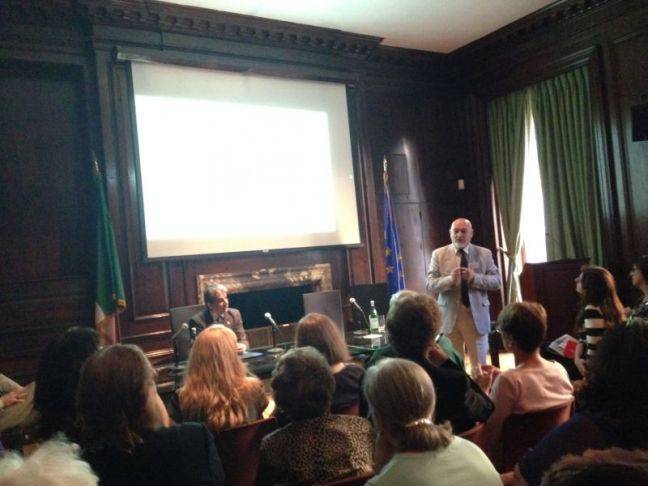The Pleasure of Learning Italian
In collaboration with The John D. Calandra American Institute of Queens College (CUNY), The Italian Cultural Institute of New York organized a very interesting panel discussion specifically aimed towards teachers of Italian as a foreign language.
Introduced by Anthony Julian Tamburri, Dean of The John D. Calandra Italian American Institute , Professor of Italian & Italian/American Studies, Paolo Balboni, Italian professor and Director of the ITALS Center at the Cà Foscari University of Venice presented the topic to the many guests who attended the event.
With the help of a very detailed power point presentation, Professor Balboni introduced the topic, pertaining to the neurolinguistic field, from the teacher’s perspective of how to approach students who are learning Italian and which is the best learning method.
“All human beings are genetically programmed to acquire a language. As a metter of fact, acquisition is spontaneous, learning is rational,” said Professor Balboni.
He also explained that a language you learn in the first three years of life is a mother tongue and you can’t forget it, “you may be just out of training.”
In addition, as the Professor said during the panel discussion, the neurons we have in our brain create a database to store information, so for teachers who are helping a student to acquire Italian (store words, grammar, speech acts, cultural models into their brains and minds), knowing how the brain and the mind work in terms of learning a language becomes something really important if they want a positive outcome within the learning process.
Another very important thing while acquiring a foreign language is motivation. Professor Balboni explained that the the hardware and the software of our brain need power in order to work properly. And this power is in fact motivation. Teachers must motivate students who learn a language.
“If we are happy, not stressed, not afraid, we produce serotonin, which contributes to our well being. And if we feel good, we learn. If we are afraid or anxious we create the so-called stress hormone and we won’t learn well,” said Professor Balboni. “A happy class is motivated to learn, an unhappy class is not.”
In conclusion, he explained that if we are motivated to learn, what we learn becomes a pleasure. So why teach Italian?
“Italian is a luxury,” affirmed Professor Balboni, “Italy is considered a place where you find pleasure. Because of the quality of life, the art, the culture and the food. So, when we teach Italian, we have to keep in mind that we are giving words to re-find pleasure, to give pleasure.”







































i-Italy
Facebook
Google+
This work may not be reproduced, in whole or in part, without prior written permission.
Questo lavoro non può essere riprodotto, in tutto o in parte, senza permesso scritto.